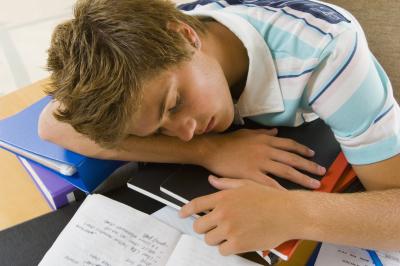A teenager who stays up until 1:00 in the morning on Saturday and sleeps until noon the next day is telling his parent some vital information: if left to his own devices, he would get 11 hours of sleep. That same teenager, staying up until 1:00 on a Tuesday morning and getting up when the alarm clock rings at 6:30 a.m. is obviously not going to be prepared for the day on half the sleep he got on a weekend night.
Recommendation
Teenagers generally need about 9 hours of sleep every night. That’s not a figure that can be averaged; sleeping in on the weekend so that they sleep 11 or 12 hours on Saturday and Sunday does not make up for those shorter nights on weeknights. In fact, not keeping the same sleep schedule consistently throughout the week can be detrimental to the body’s ability to establish a healthy sleep pattern.
Reality
Polls show that most teenagers get less sleep than they need, generally about 7 to 8 hours. Part of the problem is kids’ penchant for staying up late watching TV, playing video games, texting their friends and engaging in other activities; however, for many teenagers late-night time is the only part of the day they have to themselves. Between after-school activities, family responsibilities, homework and jobs, there are very few hours left in the day for relaxing.
Consequences
Lack of sleep, that is, less than the recommended 9 hours can result in a variety of problems for teenagers. Physically, kids of all ages are more susceptible to illnesses when they are sleep deprived. In addition, skin problems like acne can be aggravated by lack of sleep. Mentally, the ability to focus is diminished when teenagers are sleep deprived; this can cause difficulties in school. Lack of focus and clarity of vision can also lead to problems with driving, a possible life-and-death consequence. Emotionally, teenagers who lack sleep often have short fuses, an unhappy result for them, their friends and their family.
Short-Term Solutions
Increasing the amount of sleep teenagers actually need from the shorter amounts they generally receive can be a tough undertaking. Making kids aware of the consequence of too little sleep is a start, but for many teenagers these are abstract possibilities. That’s why parents will often need to impose solutions on their kids. For example, setting a time for lights out, a curfew for texting and using the computer may be necessary. In addition, parents may want to consider limiting kids’ after-school activities and household responsibilities so that teenagers can have a little more free time each day. In situations where teenagers are working, parents may have to insist their kids opt for shorter or earlier hours.
Long-Term Solutions
Since most teenagers would sleep later if a parent or an alarm clock didn’t wake them and because it’s impractical to think that they’ll go to bed early, the most obvious solution is to give kids an opportunity to sleep later. Many school districts have taken this situation seriously enough to change the high school starting time, typically 7:30 a.m. A teenager who falls asleep at 11:00 p.m. and doesn’t need to wake up until 7:30 because school doesn’t start until 8:30 gains an additional hour sleep, putting the total hours slept at 8 1/2, an amount a little closer to the ideal 9 hours.





